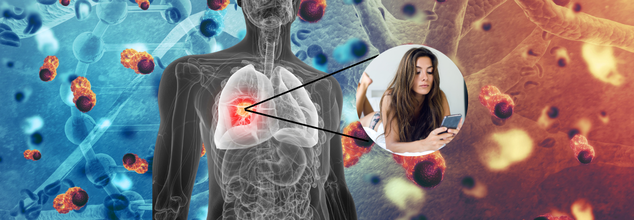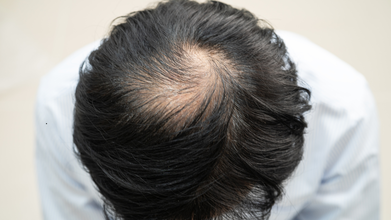- Health Conditions A-Z
- Health & Wellness
- Nutrition
- Fitness
- Health News
- Ayurveda
- Videos
- Medicine A-Z
- Parenting
Why Are Lifestyle Factors Making Millennials Vulnerable To Cancer?

Image Credit: Health and me
Cancer has been seen as a disease of aging, but now it is frightening statistics that reveal the rise of early-onset cancers among millennials. Estimates indicate that about 1.9 million people are newly diagnosed with cancer in the U.S. every year. This number will increase to 2.3 million by 2030. More and more studies are indicating that lifestyle disorders, such as an unhealthy diet, sedentary lifestyle, stress, and disrupted sleep patterns, may be a cause for which younger populations are increasingly becoming vulnerable to malignancies, including rare and aggressive types of cancer.
Has COVID-19 Worsened the Cancer Epidemic?
It has not been new news that viruses can provoke or accelerate cancer development, but research is still ongoing to understand the long-term impact of COVID-19 on cancer risk. What has already been determined, however, is that the pandemic indirectly worsened the outcomes of cancer. Delayed screenings, postponed treatments, and risks of increased mortality have all been noted globally.
The Lancet Public Health published research that underlines these consequences, indicating that the pandemic slowed or even reversed the declining cancer mortality rates observed before SARS-CoV-2 emerged. Delays in surgeries and chemotherapy treatments significantly impacted survival rates. For example, every four-week delay in colon cancer surgery increases the risk of death by 6%, while similar delays in adjuvant chemotherapy for colorectal cancer elevate mortality risk by 13%.
How Lifestyle Choices Are Driving Early-Onset Cancers
Dr. Priya Tiwari, Head of Medical Oncology, says that lifestyle choices play a critical role in the increasing incidence of cancer among young adults.
Poor diet rich in processed foods, high sugar, and red meat. Obesity and metabolic disorders are so closely linked with various cancers says Dr. Tiwari, "A sedentary lifestyle further compounds this risk, creating insulin resistance, vitamin D deficiency, and chronic inflammation, factors that are more strongly associated with colorectal and breast cancers,"
Susceptibility is further aggravated by tobacco usage, excessive alcohol consumption, and exposure to carcinogens. Stress and sleep deprivation also disrupt the balance of hormones and compromise immune function, leading to an environment conducive to tumorigenesis.
The association between stress, inflammation, and cancer.
Millennials face unprecedented levels of stress, driven by work pressures, financial instability, and excessive screen time. Chronic stress triggers the sustained release of cortisol and inflammatory cytokines such as IL-6 and TNF-α, which fuel systemic inflammation.
"Prolonged inflammation weakens immune surveillance, making the body less capable of detecting and eliminating cancerous cells before they grow uncontrollably," explains Dr. Tiwari.
The circadian rhythms have been disrupted due to late-night working hours and increased exposure to blue light. Decreased melatonin production, which is a natural cancer-fighting hormone, is associated with a higher incidence of hormone-related cancers, including breast and prostate cancer.
Are Rare and Aggressive Cancers on the Rise Post-Pandemic?
There is a rise in rare and aggressive cancers, which have been reported by medical experts post-pandemic, and possible reasons for this increase may include delayed screenings and lingering inflammatory effects from COVID-19. Many patients avoided routine health check-ups at the height of the pandemic, and this has led to late-stage diagnoses of malignancies like sarcomas, glioblastomas, and neuroendocrine tumors.
In addition, there is a theory that SARS-CoV-2 might have a part in tumor progression due to cytokine storms induced by interleukin-6 and tumor necrosis factor-alpha. This state of chronic inflammation might accelerate the growth of the tumor in predisposed individuals.
Should Millennials Start Cancer Screening Early?
Earlier, cancer screenings were typically recommended to the older people. However, with the increase of early-onset cancers among the young, screening guidelines have been revised for younger groups of populations. According to Dr. Tiwari, while universal screening is perhaps not required, screening should start earlier in cases of genetic predisposition or family cancer history.
Screening Requisiste includes:
1. Mammograms for women below 40 years of age who have a family history of breast cancers.
2. Colonoscopy for patients with a history of colorectal cancer in their family.
3. Pap smears and HPV tests for cervical cancer starting at age 21.
4. Skin exams for melanoma for those with increased sun exposure or family history.
How To Balance Lifestyle Choices And Reduce The Risk Of Developing Cancer?
Dr Priya emphasises, "A healthy lifestyle that includes nutrition, exercise, and stress management can prevent cancer in young adults. An antioxidant diet rich in fiber and omega-3 fatty acids decreases inflammation and protects against carcinogenesis. Exercise improves the regulation of insulin levels and inflammatory cytokines, thereby lowering risks of obesity-related cancers. Limiting tobacco and alcohol consumption as well as exposure to environmental toxins such as PAHs and endocrine disruptors can also reduce the risk of cancer further. Improved sleep hygiene, mindfulness for stress management, and other circadian rhythm-enhancing behaviors can also decrease the immunosuppressive effects of cortisol and therefore improve overall health."
Cancer prevention in young adults is only possible through preventive lifestyle changes. A healthy diet, regular exercise, stress control, and minimal exposure to known carcinogens will greatly reduce the risk of cancer. Here is a concise list of changes you should make now:
- Eat a Healthy Diet
- Increase antioxidant intake through foods such as berries, nuts, and leafy greens.
- Choose whole grains instead of refined carbohydrates.
- Use sources such as salmon, flaxseeds, and walnuts to increase intake of omega-3 fatty acids.
- Stay Physically Active
- Perform at least 150 minutes of moderate-intensity exercise weekly.
- Limit sedentary time for extended periods by incorporating moving activities during the day.
- Manage Stress in a Healthy Way
- Use mindfulness, which may include meditation and deep breathing, to manage the changes.
- Work-life boundaries can help alleviate chronic stress and prevent burnout.
- Improve Sleep Hygiene
- Reduce exposure to screens before bedtime to preserve melatonin.
- Develop sleep habits that allow for at least 7 to 9 hours of sleep each night.
- Limit Exposure to Hazardous Substances
- Cut back on alcohol consumption and quit smoking.
- Limit exposure to environmental toxins like PAHs and endocrine disruptors.
Increasing incidence of cancer in the millennial age group demands the need for urgent awareness and lifestyle changes. There is certainly a genetic contribution to cancer; however, lifestyle determinants, including diet, exercise, and management of stress, can all affect the course of cancer.
"Preventive care, including routine screenings and healthier lifestyle choices, holds the key to reducing the risk of cancer for young adults," said Dr. Tiwari. "Making conscious adjustments today will help millennials safeguard their health for tomorrow."
Since cancer trends continue to evolve, embracing proactive health measures, and then keeping prevention at par with treatment, will be imperative in reducing future burden caused by this disease.
Dr. Priya Tiwari is Head of Medical Oncology at Artemis Hospitals in India.
Vitamin C Serum Before and After: What Changes to Expect?

Vitamin C is a star ingredient in the skincare world for some very good reasons. It can be hailed as a magic wand to evaporate your stubborn marks and give you a brighter complexion.
However, no matter what product you use, the results do not appear overnight. So, what do real results look like? What does a before-and-after journey of using a Vitamin C serum actually entail?
This guide covers everything about the before-and-after results of using the Vitamin C serum.
What Is Vitamin C Serum and How Does It Work on Skin?
It is a potent antioxidant that can be applied to your skin directly. It neutralises the effects of free radicals, which are tiny and unstable molecules caused by pollution and UV rays. They can easily damage your skin and accelerate ageing.
Vitamin C helps by boosting collagen production and improving skin tone. This is why the results of Vitamin C on the face are so dramatic. It changes the flat look of your skin to a healthy glow.
Key benefits include:
· Brightening: It blocks the enzyme responsible for producing pigment, leading to more radiant skin.
· Fading Marks: A remarkable ingredient for targeting sun damage and acne scars.
· Collagen Stimulation: It keeps your skin bouncy and firm.
· Protection: It provides a second layer of defence against environmental stress.
Before and After Vitamin C Serum: What to Expect on Your Face
Consistent use of the serum for several weeks, along with daily application of sunscreen with SPF 50 can yield noticeable results. Here’s what you can expect from it.
Before Using Vitamin C Serum
Your skin may show signs of environmental wear and tear before you start using a serum. The following are some common complaints:
· Your skin looks tired, even after a full night's sleep.
· You may have patchy skin or dark areas around the mouth and forehead.
· Old acne spots or sun freckles that refuse to fade.
· Skin that feels slightly rough or looks congested.
After Consistent Use
The changes in your face before and after using a vitamin C serum become evident after your skin integrates the serum into its renewal cycle:
· It will give you that lit-from-within look.
· Dark spots become significantly lighter and blend into your natural skin tone.
· Your skin feels more elastic and youthful due to increased collagen.
· The surface of your skin looks smoother.
Timeline of Vitamin C Serum Before and After Results
First Week: Initial Freshness & Surface Glow
There is little change in dark spots during the first few days. However, you may notice an immediate glow on your skin surface. The serum hydrates and smoothens the skin's surface, helping makeup sit better. Vitamin C for dark spots before and after signs are clearly visible.
2–4 Weeks: Brightening & Early Spot Lightening
You will start to see the before-and-after progress of vitamin C on dark spots around this stage. Its pigment-blocking properties start to kick in. You may notice that your overall skin tone looks fresher and that the edges of your dark spots are now fading.
4–8 Weeks: Visible Even Tone and Improved Texture
The difference between your face before after vitamin C serum will be more obvious by the end of the second month. The deeper layers of the skin benefit from the antioxidant protection. You can expect the following changes:
· Visibly less sun damage
· Even complexion, so you may not need concealer
· Fewer rough patches
8–12 Weeks: Long-Term Transformation
After 90 days, your skin has gone through multiple renewal cycles. Your Vitamin C serum before-and-after photos may show significant improvement in hyperpigmentation. Fine lines may reduce because of the increased collagen, as your skin looks the healthiest it has in years.
Tips to Maximize Your Vitamin C Serum Before and After Results
If you want your before-and-after vitamin C serum results to be impressive, you need to follow these simple rules:
1. Morning is Best: Apply your serum in the AM. This allows the antioxidants to protect your skin from pollution and sunlight throughout the day.
2. Pair with Sunscreen: Always follow up with a sunscreen. Vitamin C is not a replacement for sunblock, but it actually makes your sunscreen with SPF 50 more effective by neutralizing the rays that slip through.
3. Storing the Serum: Vitamin C is sensitive to light and air. Keep your bottle in a cool, dark place (such as a drawer) to ensure it does not lose its potency. If your serum has become dark or orange in colour, it may have been oxidised. So, it may not work well.
4. Consistency: You do not need a huge amount of serum. 3–4 drops are enough. You need to apply it every single day without skipping.
Final Thoughts
The journey of your face before and after Vitamin C serum can feel long, but the results are worth it. It can be exciting to see the initial glow. However, the real changes, such as fading deep dark spots and firming the skin, take time. Stick to a routine and pair your skin with a high-quality sunscreen to stay radiant and youthful.
The Healthandme team was not involved in authoring this story
This Game Could Cut Your Dementia Risk, Says Study

Credits: Canva
Scientists say they have uncovered the first strong evidence that a specific type of brain training could meaningfully reduce the risk of Alzheimer’s disease. The findings come from the Advanced Cognitive Training for Independent and Vital Elderly (ACTIVE) study, a large US clinical trial that followed 2,802 healthy adults aged 65 and older for 20 years. Published in Alzheimer’s & Dementia: Translational Research & Clinical Interventions, the research found that participants who completed a targeted “speed of processing” brain training programme, along with booster sessions, had a 25 per cent lower risk of developing dementia compared to those who received no training.
Why This Matters
Dementia remains one of the most pressing health challenges worldwide. In the UK alone, around 900,000 people live with the condition, with Alzheimer’s disease being the most common form. There is currently no cure. While newer drugs may modestly slow cognitive decline for some patients, they do not stop or reverse the disease.
That is why prevention, or even delay, is so crucial. Even pushing back the onset of dementia by a year or two across the population could significantly reduce strain on families, healthcare systems and social care services.
Lifestyle factors already play an important role. Regular exercise, managing blood pressure and diabetes, avoiding smoking and staying socially active are all linked to lower dementia risk. Now, this new research suggests that certain types of structured mental training may also help.
Inside the ACTIVE Study
Back in the late 1990s, researchers randomly assigned older adults to one of four groups:
- Speed-of-processing training
- Memory training
- Reasoning training
- No training (control group)
Each participant attended ten hour-long sessions over five to six weeks. Some who completed most of the sessions were later randomly selected to receive additional “booster” sessions about 11 months later and again after 35 months. In total, participants completed between 10 and 22½ hours of training spread over three years.
Memory training focused on mnemonic techniques. Reasoning training involved identifying patterns and solving structured problems. But it was the speed-of-processing training, delivered through a computer-based programme, that stood out.
The Brain Game That Made a Difference
One of the key exercises, called Double Decision, required participants to quickly identify a central object (like a specific car) while simultaneously locating a road sign that briefly flashed in their peripheral vision. As players improved, the images appeared for shorter periods, increasing difficulty.
The best possible score in the game was 32 milliseconds. The average score hovered around 100 milliseconds, but participants who stuck with the programme often improved to about 50 milliseconds — nearly doubling their processing speed.
Unlike memory drills, this training targeted how quickly and accurately the brain processes visual information — a skill that tends to decline with age.
What Happened Over 20 Years?
Researchers tracked participants’ health records to see who was later diagnosed with Alzheimer’s disease or related dementias. Nearly half of the control group developed dementia during the two-decade follow-up.
The same held true for those who received memory or reasoning training.
However, the group that completed speed training and received booster sessions had a strikingly different outcome: their risk of dementia diagnosis was 25 per cent lower than the control group.
A Note of Caution
The researchers themselves urge caution. The people who benefited most were those who completed the initial sessions and returned for boosters. It’s possible that these individuals were already more motivated, healthier, or cognitively stronger — factors that may independently reduce dementia risk.
To address this, booster sessions were randomly allocated among eligible participants, and analyses adjusted for age, education, baseline cognitive performance and other health factors. Still, no statistical method can completely eliminate the possibility that the most engaged participants were also those most likely to stay healthier longer.
Henry Mahncke, chief executive of Posit Science — the company behind the training software — described the results as “astonishing” and potentially transformative for brain health.
The academic authors, including researchers from Johns Hopkins School of Medicine, the University of Pennsylvania and the University of Washington, were more measured. They concluded that speed-of-processing training “has the potential to delay the diagnosis” of Alzheimer’s and related dementias — but further research is needed.
If confirmed, the implications could be profound. The idea that even later-life brain training might buy people more time before dementia sets in offers a rare note of hope in a field where breakthroughs are hard won.
Ancient Chinese Medicine Could Hold The Secret To Hair Regrowth

Credits: Canva
Can Chinese medicine cure baldness? Baldness has long been dealt as a matter of shame over health. Products focus on hiding the bald patch rather than curing it. Baldness has in the past made global headlines when South Korean president Lee Jae Myung said 'Baldness is the new enemy' and suggested that insurance should cover the treatment as a part of medical treatment.
Androgenetic alopecia (AGA), better known as pattern hair loss, is the most common form of hair thinning worldwide. While medications like finasteride and minoxidil remain the standard line of treatment, concerns around side effects, lifelong use, and mixed results have led many people to explore gentler, more holistic alternatives.
A new scientific review now suggests that Polygonum multiflorum—a root used in traditional Chinese medicine for over a thousand years—may hold real promise in managing AGA. Historically described as a remedy that can “blacken hair and nourish essence,” the herb is gaining renewed attention as modern research begins to unpack how it actually works at a biological level.
A Multi-Pathway Approach to Hair Health
Most conventional hair-loss treatments target a single biological mechanism. Polygonum multiflorum, however, appears to work on several fronts at once. According to the review, the herb helps reduce the activity of dihydrotestosterone (DHT), a hormone strongly associated with hair follicle shrinkage in AGA.
At the same time, it protects hair follicle cells from premature cell death and activates key growth-related signalling pathways, including Wnt and Sonic Hedgehog (Shh), both crucial for maintaining a healthy hair growth cycle. The herb may also improve scalp blood circulation, potentially enhancing the delivery of oxygen and nutrients to hair follicles—an often overlooked factor in hair thinning.
Ancient Records Meet Modern Biology
“Our analysis bridges ancient wisdom and modern science,” said Han Bixian, the lead author of the review published in the Journal of Holistic Integrative Pharmacy. “What surprised us was how consistently historical texts—from the Tang Dynasty onward—described effects that align closely with today’s understanding of hair biology.”
The researchers examined a wide range of evidence, including laboratory studies, clinical observations, and historical herbal literature. Together, these sources suggest that Polygonum multiflorum does more than simply slow hair loss—it may actively support healthier hair function.
Beyond Slowing Hair Loss
One of the most striking findings is the herb’s potential role in hair regeneration. Rather than only delaying further thinning, Polygonum multiflorum appears to influence multiple growth factors involved in restarting and sustaining the hair cycle. This broader mode of action could give it an edge over treatments that focus on just one biological target.
Safety, Processing, and What Comes Next
The review notes that when properly processed—a critical step in traditional preparation, the herb shows a relatively favorable safety profile. This could make it more appealing to patients concerned about side effects such as sexual dysfunction or scalp irritation commonly linked to existing medications.
That said, the authors stress the need for more high-quality clinical trials to confirm effectiveness, establish safe dosing, and standardize preparation methods. Even so, the findings highlight how rigorous scientific study of traditional remedies can uncover new possibilities for treating common conditions like androgenetic alopecia.
© 2024 Bennett, Coleman & Company Limited

